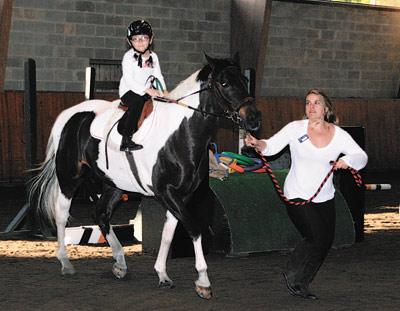Kids’ Self-Esteem Mounts

The benefits that therapeutic riding affords children with various disabilities were on display at Wolffer Estate in Sagaponack Friday evening, most easily discerned in the riders’ eyes as they performed maneuvers on horseback before a large group of spectators who looked on and applauded from a glassed-in room above the indoor ring.
The event was put on by the Center for Therapeutic Riding of the East End, whose director, Karen Bocksel, told a visitor, “We teach horseback riding to those with physical, cognitive, and emotional disabilities. We give 25 lessons a week here, mostly to children, though we recently took on our first adult rider. . . . The Germans started therapeutic riding in the late ’40s, beginning with students who had physical disabilities. Now — it’s been in the United States since the late ’60s — it embraces all disabilities.”
Therapeutic riding, according to a flier available to the attendees, helps to improve muscle tone, posture, balance, coordination, and endurance; sharpens sensory experience; boosts self-esteem and motivation through the acquisition of new, goal-oriented skills, and promotes social interaction with one’s fellows, of the two and four-legged kind.
When asked if the children were fearful the first time they found themselves astride a horse, Bocksel, who has more than 20 years of experience in the field — she is PATH International’s New York State chairwoman and an instructor evaluator as well as a site accreditation lead visitor — smiled and said, “The parents are fearful — the kids aren’t.”
Friday’s riders, who were put through their paces by Jill Carney, a certified Professional Association of Therapeutic Horsemanship instructor, included Collier Lee, Ava McKelvey, Rachel McKelvey, Amanda Shortt, and Hope Hamilton.
When a visitor said, after watching volunteers lead horses and riders around in the ring under Carney’s watchful eye, that the kids seemed to love it, Bocksel, said, “They do.”
“We are growing,” she added, “and we do not turn any riders away. We have a scholarship program to assist any rider who may have financial challenges. About one-third of our riders receive scholarships.”
Questioned further, Bocksel said, “We are funded entirely through sponsorships and private donations. Wolffer gives us a substantial discount on the board of our three horses — one CTREE owns, two are free-leased from private owners — and they’ve donated office space at the stable!”
“We have two part-time employees, the rest are volunteers. We have 25 volunteers at the moment, but we can always use more. They must be at least 14 years old and while they don’t have to have horse experience, it’s helpful. We provide a two-hour orientation.”
“Volunteers are the heart and soul of our organization,” she said. “We could not operate without them.”
CTREE, two of whose riders — Rachel McKelvey and Declan Carey — won ribbons in last summer’s Hampton Classic class for riders with disabilities, will hold a fund-raiser at the Sebonack Country Club in Southampton on Aug. 23. It will also hold a horseless horse show that month.
